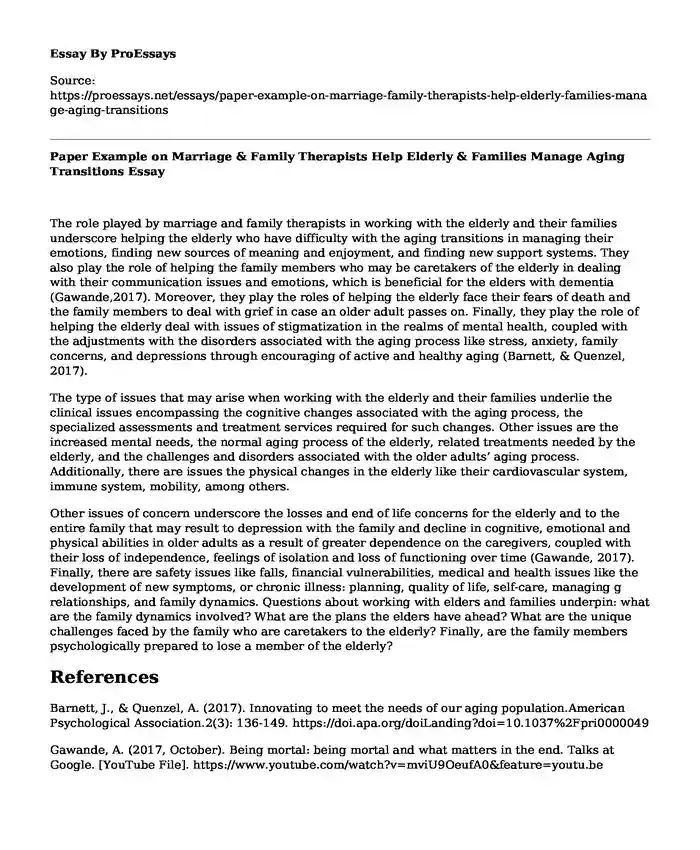The role played by marriage and family therapists in working with the elderly and their families underscore helping the elderly who have difficulty with the aging transitions in managing their emotions, finding new sources of meaning and enjoyment, and finding new support systems. They also play the role of helping the family members who may be caretakers of the elderly in dealing with their communication issues and emotions, which is beneficial for the elders with dementia (Gawande,2017). Moreover, they play the roles of helping the elderly face their fears of death and the family members to deal with grief in case an older adult passes on. Finally, they play the role of helping the elderly deal with issues of stigmatization in the realms of mental health, coupled with the adjustments with the disorders associated with the aging process like stress, anxiety, family concerns, and depressions through encouraging of active and healthy aging (Barnett, & Quenzel, 2017).
The type of issues that may arise when working with the elderly and their families underlie the clinical issues encompassing the cognitive changes associated with the aging process, the specialized assessments and treatment services required for such changes. Other issues are the increased mental needs, the normal aging process of the elderly, related treatments needed by the elderly, and the challenges and disorders associated with the older adults’ aging process. Additionally, there are issues the physical changes in the elderly like their cardiovascular system, immune system, mobility, among others.
Other issues of concern underscore the losses and end of life concerns for the elderly and to the entire family that may result to depression with the family and decline in cognitive, emotional and physical abilities in older adults as a result of greater dependence on the caregivers, coupled with their loss of independence, feelings of isolation and loss of functioning over time (Gawande, 2017). Finally, there are safety issues like falls, financial vulnerabilities, medical and health issues like the development of new symptoms, or chronic illness: planning, quality of life, self-care, managing g relationships, and family dynamics. Questions about working with elders and families underpin: what are the family dynamics involved? What are the plans the elders have ahead? What are the unique challenges faced by the family who are caretakers to the elderly? Finally, are the family members psychologically prepared to lose a member of the elderly?
References
Barnett, J., & Quenzel, A. (2017). Innovating to meet the needs of our aging population.American Psychological Association.2(3): 136-149. https://doi.apa.org/doiLanding?doi=10.1037%2Fpri0000049
Gawande, A. (2017, October). Being mortal: being mortal and what matters in the end. Talks at Google. [YouTube File]. https://www.youtube.com/watch?v=mviU9OeufA0&feature=youtu.be
Cite this page
Paper Example on Marriage & Family Therapists Help Elderly & Families Manage Aging Transitions. (2023, Sep 25). Retrieved from https://proessays.net/essays/paper-example-on-marriage-family-therapists-help-elderly-families-manage-aging-transitions
If you are the original author of this essay and no longer wish to have it published on the ProEssays website, please click below to request its removal:
- American Express Campaigns
- Veterans in the Criminal Justice System and PTSD Essay
- Reflecting on the End of Racial Representation - Chapter Discussion
- Alzheimer in HBO Documentaries Paper Example
- Paper Example on Making an Impact: Newborn Hope Foundation
- Vituity: A Physician-Led Partnership for Improving Patient Care - Paper Example
- Free Paper Sample: Theories, Principles, and Models of Communication







